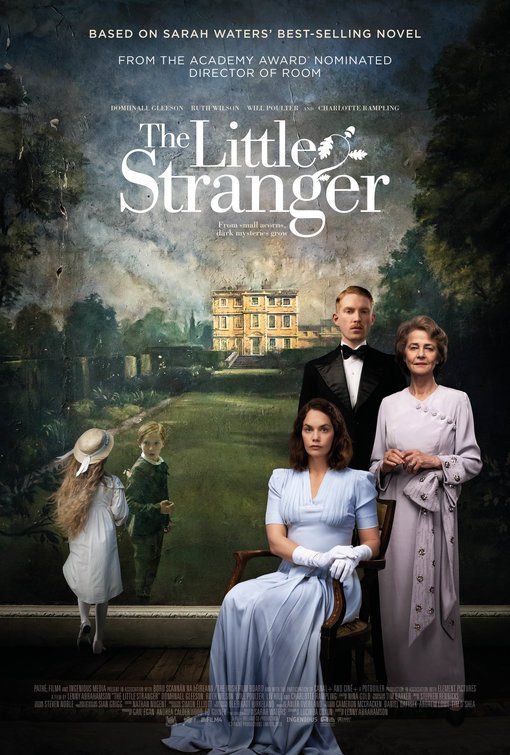“Ironic Humanist Explanations”

| None | Light | Moderate | Heavy | |
|---|---|---|---|---|
| Language | ||||
| Violence | ||||
| Sex | ||||
| Nudity |
What You Need To Know:
A little slow and subdued at times, THE LITTLE STRANGER is a nearly perfect example of a ghost story where it’s not clear whether the ghost is real or not. Despite its production values, narrative skills and excellent performances, THE LITTLE STRANGER has an ending where murder and wickedness aren’t punished. The movie also doesn’t totally refute the story’s occult explanations. Finally, THE LITTLE STRANGER has some foul language. Since evil is victorious, MOVIEGUIDE® rates the movie as abhorrent.
Content:
Strong ironic humanist worldview with overt occult elements provides a humanist, anti-supernatural explanation for mysterious, strange events that some people think are being caused by a malevolent ghost, plus evil succeeds at the end and brief Christian elements when movie shows a few words by a pastor leading a gravesite funeral service;
Five obscenities, one GD, nine light profanities;
Brief extreme and strong scary violence with some blood includes mostly friendly dog suddenly mauls a little girl’s face, and doctor works to save her life and treat bloody wounds on her face, character’s body is found stabbed to death, character falls or is pushed to their death down a long stairwell, character bloodies hands when they try to get out of a room through a window where a malevolent force seems to have imprisoned them, mother slaps son’s face hard when she sees that he broke something in another family’s house, character opens a ceiling door and is startled by some debris and blames mice for the problem, dog is put down after suddenly mauling young girl’s face, and character angrily pounds on car’s steering wheel repeatedly when they get upset about something;
Passionate kissing, man puts hand on woman’s upper thigh, and unmarried couple starts to have fornication in a car, but woman stops the man and leaves the car;
No nudity;
Alcohol use;
Smoking but no drug content (a dog that mauled a girl’s face is put down); and,
Greed, lust, madness, jealousy, and man claims women are too emotional.
More Detail:
Based on a novel, the horror movie THE LITTLE STRANGER is about a small-town doctor in 1948 England who falls for the pretty female heir of a huge but impoverished country estate, where she and her brother and mother may or may not be haunted by the ghost of their sister/daughter, who died of an illness when she was young. Though the narrative is interspersed with small clues giving a natural explanation to the alleged haunting, throughout most of its running time, the movie is an almost perfect, but flawed, example of Fantastic storytelling. The doctor keeps giving the family natural explanations for the strange, uncanny events while first the brother, then the mother, then the sister decide on a supernatural explanation.
As a boy, Dr. Faraday visited the family’s magnificent house once in 1919, but the house has fallen into disrepair. The doctor begins treating Caroline’s brother, Roderick, who’s in terrible pain from the horrible wounds he suffered during World War II.
One evening, a little girl gets mauled by Caroline’s seemingly friendly dog. Dr. Faraday has to euthanize the dog.
Then, Roderick begins to hear strange sounds and sets the library on fire. As a result, Roderick is sent to an insane asylum.
Caroline and Roderick’s mother thinks they’re being haunted by her dead daughter, who died shortly after Faraday met her in 1919. Faraday tries to allay that belief using his medical knowledge and scientific theories, but strange events keep happening. Meanwhile, he and Caroline begin a budding romance.
Will the strange events continue? Will Faraday and Caroline be able to solve the problem?
THE LITTLE STRANGER moves a bit too slowly, but it’s compelling, mysterious, suspenseful, and scary enough to maintain the viewer’s interest. Also, its narrative is an excellent, even profound, representation of Todorov’s brilliant ideas about the Fantastic, the Fantastic-Uncanny, and the Fantastic-Marvelous. Sadly, though, some of the clues leading to the natural explanation at the end are too subtle or ambiguous for the average viewer. Also, the final explanation doesn’t fully explain some of the events surrounding the alleged haunting. For example, the movie suggests at a couple points that the house itself may be a malevolent force that affects the natural world. Thus, the final explanation appears to relieve all doubt, but it’s handled in such an ambiguous way that doubt is reintroduced. Does the mysterious effect of the house create a plot hole? Is it another red herring? Or, is it a possible supernatural explanation at the end?
Despite its production values, narrative skills and excellent performances, THE LITTLE STRANGER has an ending where murder and wickedness aren’t punished. The movie also doesn’t have any strong Christian elements and, in fact, doesn’t totally refute the occult explanations that occur in the story. There is a brief scene where a Christian pastor reads some words at a funeral, but that’s about it. Finally, THE LITTLE STRANGER has some mostly light obscenities and profanities. However, since evil is ultimately victorious, MOVIEGUIDE® must rate the movie as abhorrent.


 - Content:
- Content: 

